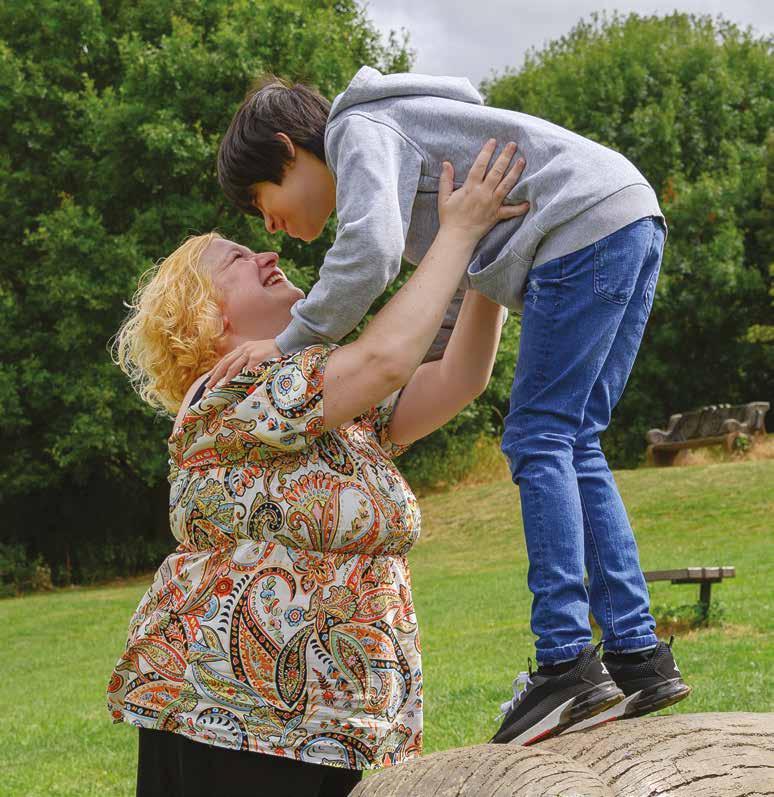

Autumn 2022 YOUR Distressed behaviour at school, cost of living help, and our Autism at Work programme Plus Telling it like it is Comedian Fern Brady Overlooked and misunderstood Women and girls’ late diagnoses Standing up for your rights Diego and Marta’s story
RUSKIN MILL TRUST IN ENGLAND
argent college
Birmingham, 16-25
grace garden school Bristol, 9-16
sunfield school Clent, 6-19
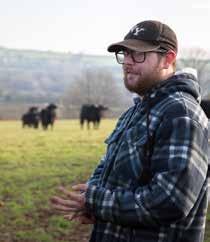
clervaux garden school Darlington, 10-19

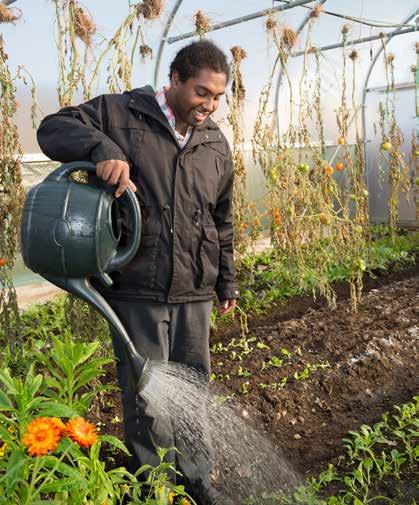
clervaux fold Darlington, army families
clervauxrise Darlington, 18+ ruskin mill college Nailsworth, 16-25 brantwood specialist school Sheffield, 7-19 freeman college Sheffield, 16-25
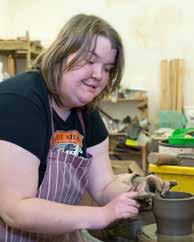
college Stourbridge, 16-25
IN SCOTLAND
IN WALES
coleg plas dwbl Clynderwen, 16-25 coleg ty’r eithin Swansea, 16-25
Applications and referrals are taken all year round. Contact us today to find out more or to arrange a visit at a time to suit you. 0330 055 2653 | rmt.org admissions@rmt.org ruskinmill ruskinmilltrust re-imagining potential Specialist day and residential provisions for children and adults with learning differences and disabilities in England, Wales and Scotland. Ruskin Mill Trust’s unique method Practical Skills Therapeutic Education enables individuals to forge a sense of identity, gain qualifications and independent living skills, and re-imagine their potential for a brighter future.
fairhillrise East Lothian, 16+
glasshouse
coleg trigonos Opening 2023
EDITOR Suzanne Westbury YourAutismMag@nas.org.uk
CONTRIBUTORS
Frances Hutchman, Jamie Rae
HEAD OFFICE
National Autistic Society 393 City Road London EC1V 1NG Tel: 020 7833 2299 www.autism.org.uk
SUPPORTER CARE TEAM 0808 800 1050 membership@nas.org.uk
ADVERTISING
James Pembroke Media Tel: 0203 859 7098 hoby.abdel@jamespembroke media.co.uk
SUBSCRIPTIONS
Only available to members of the National Autistic Society. To join, visit www.autism.org.uk
DESIGN AND PRODUCTION
CPL (Cambridge Publishers Ltd) 01223 378000 www.cpl.co.uk
1 Cambridge Technopark, Newmarket Road, Cambridge CB5 8PB
PRINT
Warners Midlands 01778 391000
National Autistic Society is a charity registered in England and Wales (269425) and in Scotland (SC039427) and a company limited by guarantee registered in England (No.1205298), registered office 393 City Road, London EC1V 1NG

© Your Autism magazine Autumn Vol 56, No 3
National Autistic Society ISSN 2055-0413
The views expressed in Your Autism and any enclosures or advertisements are not necessarily those of the National Autistic Society. In the interest of providing readers with the widest range of information, we may include details of some of the many approaches to autism. However, this does not imply our charity’s endorsement of any particular approach or product. The inclusion of a website does not necessarily imply that our charity endorses or supports the group or individuals running the website, nor does the absence of a website imply that our charity does not endorse or support the group or individual running the website.
Contents
What’s new
A round-up of the latest news
Our ‘Moonshot’ project Mapping out a society that works for autistic people

My diagnosis
Psychologist Lee Chambers
Fighting for support Marta has battled for son Diego’s rights all his life
“Stand-up is the only time I feel comfortable” Comedian Fern Brady explains
Autism at Work
Meet Max, who is happy in a role for the first time
Women and girls
The issue of late diagnosis
A lifetime of care
We hear Mike’s story
Readers to the rescue
Negotiating the benefits system

Cost of living crisis
What help is available
School distress
How to help your child
Notebook
Things to read, do and see
I’m a... Duke of Edinburgh gold award holder
We chat to Duncan Bolling
“The average age of diagnosis in girls was between 10 and 12, but between four and six for boys”
Autumn 2022 3
Autumn 2022 YOUR 34 04 08 11 12 16 20 22 26 30 32 34 39 42 22 Lee Chambers Late female diagnosis 22 11 School advice
What’s new?
Our round-up of the latest news and views
Draft Mental Health Bill published
The Government has published its draft bill to change mental health laws in England and Wales. This is a huge step forward in the bid to reduce the number of autistic people being wrongly detained in mental health hospitals.
The draft bill proposes changing the definition of ‘mental disorder’
in the Mental Health Act so that it no longer includes autism. This should help prevent the wrongful detention of autistic people who do not have a mental health condition.
The bill will introduce a duty for councils, NHS England and local health decision-makers to provide enough of the right community services. This should prevent autistic people reaching crisis point and having to stay in an institution because there is nowhere else to go.
Actions from Care and Treatment Reviews will also become enforceable, helping autistic people get discharged from hospitals sooner.
Christmas cards now on sale
Congratulations to our Christmas card competition winners! We ran our annual competition to find new, unique designs for our Christmas card range, which we put to a vote on social media. The children’s winner is Fire and ice Christmas baubles by Freddie, aged eight. Our adult winner is Poppy, who designed the lovely Polar bear Christmas
Everything you buy from our Christmas range will go towards our work to create a society that works for autistic people.

Cards are on sale now, so get yours at autism.org.uk/christmas-cards


Get in touch!
We and our supporters have been calling for these reforms for years. Autism is not a mental health condition and mental health hospitals are not the right place for the vast majority of autistic people. Yet some spend many months, or even years, in hospitals miles from their families. In July 2022, 1,215 autistic people were in inpatient mental health hospitals in England.
Read the draft Mental Health Bill at gov.uk/government/ publications/draft-mental-healthbill-2022
We have advice and guidance on mental health at autism.org. uk/mentalhealth
4 Your Autism
Fighting disability discrimination
Congratulations to our member John Matthews, who has persuaded a theme park to change its policy on charging carers full price.
John said: “My autistic son is 22 and likes to visit the Peppa Pig World theme park in Hampshire.

Celebrating our branch volunteers
We were thrilled to hold our first Branches Awards Ceremony in June. It was brilliant to see so many people recognising the hard work of our branch volunteers, and celebrating their huge impact in communities across the UK.
Well done to all the nominees and winners. This includes Anthony QuinnFlipping (pictured above) and Wendy West, who were named Branch Volunteer of the Year and Autistic Branch Volunteer of the Year respectively. After struggling to find local support for his two autistic sons, Anthony launched our Swansea Branch in 2015. Wendy set up the West Devon Autistic Women’s Group nine years ago. They both work tirelessly to support autistic people and their families, and to improve local services.
The other winners were:
● Young Branch Volunteer of the Year: Eleanor Ball and Molly Binfield (joint
winners), Swansea Branch and Thurrock Branch
● Most Imaginative Branch Fundraising Event: Ben Egryn Nicholas, North Somerset Branch Chair
● Outstanding Branch Event: Thurrock Branch
● Most Imaginative Online Branch Activity: Highland Branch
● Outstanding Branch Campaign of the Year: South Lanarkshire Branch
● Outstanding Branch Community Impact: Newtownards Branch
● Longstanding Commitment to National Autistic Society Branches: Haywood Drake
Read more about the winners at autism.org.uk/ branchawards Search for your local branch at autism.org.uk/ branches
“He has to pay full price for a ticket, which is fair enough. I challenged the park’s policy of also charging me (as my son’s carer) full price to enter. I explained that my son cannot access the facilities without my one-to-one support. Each ticket costs £40.

“I believed this to be in breach of the Equality Act 2010. Not removing the requirement for carers to pay was a failure to make ‘reasonable adjustments’ under the Act.
“I saw no reason why disabled people should pay £80 (twice as much as a non-disabled person) to access the park. Numerous other similar attractions allow carers to go free.”
John talked to two of the directors of Paultons Park and they have agreed to introduce a revised ticketing system, which will allow carers to enter the park free of charge by next summer. John is pressing the directors to introduce interim measures so that carers do not have to pay between now and the new system going live. He advises that, if you are planning to visit and a free carer ticket is not available on the website, call the park and ask them to provide one.
Autumn 2022 5 News
Diary dates
What to do and where to go
2 October 2022
TCS London Marathon
9 October 2022
Royal Parks Half Marathon
If you have a ballot place and would like to join Team Autism for either event, please visit autism.org.uk/running

14 November 2022
Matt and Co Comedy Show
Join our ambassador Matt Richardson, Fern Brady, Rosie Jones and many more at our comedy show in London. Book your tickets at autism.org.uk/ mattandco

26 November 2022
Annual General Meeting (AGM)
We hope to see you at our AGM. There will be updates on our work and campaigns, workshops, and a chance to vote on our future work.
7 December 2022
Starshine Carol Concert
Save the date for an evening of Christmas carols and festive cheer, featuring the EC4 Music Choir and celebrity guests!
27 March to 2 April 2023
World Autism Acceptance Week
Add these dates to your diary if you are hoping to take part, especially if you work in a school with a busy events calendar.
Volunteer for us! From cheering on our runners to photography and more, we’d love you to help us. Please email myevent@nas.org.uk for upcoming events and how to get involved.
Remembering Lord Christopher Wakehurst
We were sad to hear that Lord Christopher Wakehurst died in July. He devoted his life to trying to make society work better for autistic people by setting up the Inge Wakehurst Trust, and supported our charity for several decades.
Lord Wakehurst was born John Christopher Loder in 1925. He inherited his peerage when his father died in 1970, and was a member of the House of Lords until 1999. Lord Wakehurst had two children, Timothy (who is autistic) and Christina. Sadly, their mother, Lord Wakehurst’s first wife, Inge, died in 1977. In her memory, Lord Wakehurst set up the Inge Wakehurst Trust.
Society was very different in the 1970s, and understanding of autism was incredibly low. The Inge Wakehurst Trust put on some of the first conferences to help people learn about autism. Later, it supported our charity to set up our own training service, which now reaches 18,000 professionals a year.
Because of the Trust, parents of newly diagnosed autistic children had somewhere to turn for support through the funding of our charity’s advice line, as well as what is now our Lorna Wing Centre.
The Trust was formally wound up in 2018, following its last grant to research on health inequality for older autistic people at Newcastle University, which has left a strong legacy.
Lord Wakehurst is survived by his wife, Brigid, and his son, Timothy. Our thoughts are with all Lord Wakehurst’s family at this very difficult time.
The National Autistic Society owes an enormous debt of gratitude to Lord Wakehurst. Without his support, our charity might never have grown from its humble beginnings in North London 60 years ago to becoming a national charity with a wealth of advice and support for autistic people and their families throughout their lives.
6 Your Autism
Home From Home Care

For individuals with complex needs, we create bespoke residential services with meaningful pathways to greater independence.
Parents - We deliver fulfilled days for your sons and daughters through effective care and support, focusing on independence, selfworth and new opportunities.
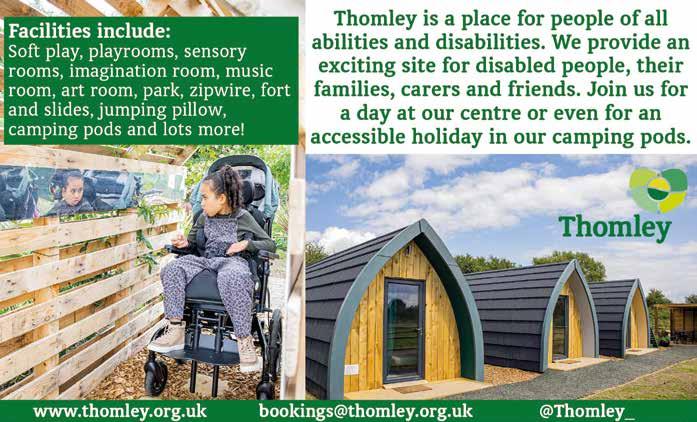
Teachers - We build on your dedication and life skills, to ensure your students progress and develop to their fullest potential.
Commissioners - We are a proven and successful social care alternative to ATUs for adults with learning disabilities and high acuity needs, autism and complex health & mental health.




Learning Disabilities, Autism and Complex Physical and Mental Health




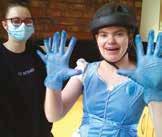





UK’s Largest Family-Led Specialist Residential Care Provider
0800 587 0372 homefromhomecare.com
Our ‘Moonshot’ project

Back in 1962, when the National Autistic Society was set up, our founders’ goals were clear. They fought for their autistic children’s rights. Sixty years later, that goal is still central to our charity’s vision. We exist to create a society that works for all autistic people and their families.

But we want to know and say more about what that society would really be like.
Earlier this year, we started a project to describe what it might look and feel like for autistic people and their families. It is important we know this, because it means that our charity, other organisations and campaigners, as well as governments, will know what they should aim for.


Helen Ellis is part of the team working on our charity’s exciting project to map out what a society that works for autistic people would look like. Here she shares an update
8 Your Autism Future
Internally, we called this project our ‘Moonshot’. This is because it’s really ambitious. We are talking about huge changes to society. And just like the NASA programme to land on the moon, we know that it can’t be achieved in one step. So, we want to find clear milestones that will need to be achieved along the way across all parts of autistic people’s lives.
Lots of you shared your ideas with us when we asked our supporters what changes they want to see. Thank you!

We don’t know what the final name for our project will be, we will publish our vision later in the autumn. It will also help us decide our charity’s plans for the next few years. One thing I can share now though is my experience on
We are talking about huge changes to society
working on this project, both as an autistic person and as a member of staff at the National Autistic Society. It has honestly been one of the most challenging, exciting and satisfying projects I have ever been involved in. I’m incredibly proud of how central autistic voices and lived experience has been at all stages.
From seeing the amazing craft work by autistic adults that came out of a participation session at one of our charity’s day centres, to listening to the insightful responses from our supporters about where they see challenges and opportunities in different areas of society, it’s been a fascinating journey.
To me, it really captures all the progress and challenges of the past 60 years.
Throughout the project, we’ve made sure that we have considered all parts of society, and made sure that every stage and facet of autistic life is recognised and respected.
From sensitive discussions about ageing and even end-of-life care and decisions, to mindblowing ‘future gazing’ exercises imagining how technological advances might impact on autistic people’s employment and access to public spaces, we have tried to cover as much ground as we can. We have also kept in mind that a lot of barriers that autistic people face are also heavily influenced by racism, classism, sexism and other forms of discrimination and outdated unhelpful stereotypes.
To return to the metaphor of ‘Moonshot’, we now know where the moon is – we know what we’re aiming for. We will have a fairly good design for the spacecraft – we will have our milestones to meet. But we are going to need a huge number of talented and passionate people to help us get that spacecraft to land on the moon. I firmly believe we will do that one day and that truly will be one huge step for all of mankind.
Look out for the latest news on this project at autism.org.uk and on our social media channels.

Future Autumn 2022 9

My diagnosis
“Receiving my diagnosis was liberating and frightening”
Psychologist and wellbeing consultant Lee Chambers was diagnosed aged 36
I have always felt I was ‘distinct’: the way I thought; my sensory challenges, social difficulties and unusual communication.
Growing up in the 1990s, there was no awareness of neurodiversity. I didn’t hear about autism until university, which was one of the most difficult times of my life. I was trying to live independently and mask my way to normal student existence. Sadly, this led to severe autistic burnout, forcing me out of university to recover.
I managed to get back, more self-aware and wiser, but I hit similar issues at work. Corporate culture shoehorned me and limited my ability to get anywhere near my potential. Thankfully, the 2008 recession put me out of my misery, giving me the impetus to launch video games retailer PhenomGames. I built the business around being myself, staying out of the spotlight, and doing what I do best.
I stopped worrying about a diagnosis because I was able to control most elements of my life. I started a family and
Find out more about Lee at leechambers.org
Want to share your or your child’s diagnosis story? Email YourAutismMag@nas.org.uk

time marched on. It only came back onto the radar when we pursued a diagnosis for my son. After the parent interviews, the psychologist said to me, with a smile, that the “apple doesn’t fall far from the tree”. This comment led me on my own pathway to getting my diagnosis in 2021.
Bringing back memories
Receiving my diagnosis was liberating and frightening. It brought back emotional memories, and gave me some answers to why my journey had all those twists and turns. It has empowered me to speak about being an autistic entrepreneur, and how businesses have a role to play in the future of neurodiversity.
One area I am passionate about is where autism intersects with race, community acceptance and representation in underprivileged groups. I will continue to spread a message of positive representation of black autistic men, while advocating for increased awareness and understanding for autistic women.
My dream is to be a role model for the next generation who are diagnosed earlier and into a more accepting world. They will achieve amazing things if conditions are created to enable them to thrive.
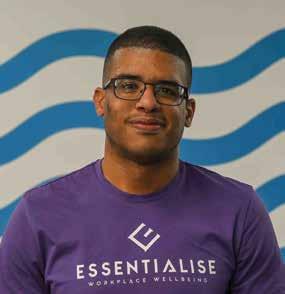
Autumn 2022 11
Fighting for support
Marta has battled for Diego’s rights all his life. She tells us about him, and gives advice to other parents

Diego was identified as having special needs very early on. He was born extremely premature, at 26 weeks, and with extreme low birth weight (1lb 2oz). Diagnosed as autistic before his third birthday, Diego is non-verbal and has massive sensory issues.
Diego is a very happy boy. He’s very smart and very loving. He loves technology, music, comedy, swimming, going outdoors and climbing. He struggles with all types of communication and gets very frustrated when we don’t understand what he’s trying to communicate to us.
I can’t emphasise enough that I’m speaking from the point of view of people who live in the most deprived parts of a borough. Not everybody experiences the same journey in regards to services, and this is mainly because of the class division in our society. People living in certain postcodes will have better access to services compared with others who live in a different postcode, even within the same borough. Accessibility to services can also depend on the disability of the child. Autism services are currently overwhelmed. When Asperger syndrome was included with autism, no significant increase in resources was put into place. Also, the increase in autism diagnoses in an already overwhelmed system only stretches resources even further.
No provision
Our battle has continued throughout Diego’s life. We thought a diagnosis would ensure appropriate support, but we were wrong
about that. The reality is that any provision for autistic kids is basically non-existent. We are led to believe that others have the support. People with high needs believe that people with low needs have all the support, and people with low needs believe people with high needs have all the support. It’s all a fallacy. However, I didn’t know that back then, so – after Diego’s diagnosis – there was no change in the ‘support’ he was getting. As a non-verbal child, he was seen by a speech and language therapist (SLT) once a month in a group session with many other children. Our borough didn’t have a paediatric occupational therapist (OT) team. The only OT was provided by the NHS adults’ team via the local clinical commissioning group (CCG).
When we tried to ensure Diego’s provision in his first Education, Health and Care Plan
12 Your Autism
Real life
(EHCP), we had a local authority worker who went above and beyond in reflecting Diego’s needs and trying to ensure adequate provision. To our surprise, the whole document was changed without informing us and we barely recognised the text we had worked so hard for.
The provision set in that EHCP was only speech and language, once a month, in a group setting. For a child who has severe communication disabilities, that provision is highly inappropriate. It’s only a tickbox exercise to justify that disabled children are being supported. It would be better if they owned up and stated that they have no provision for non-verbal children.
We had to appeal the EHCP, spending our savings on assessments and lawyers. The tribunal ordered in Diego’s favour. The SLT
Marta’s advice
When fighting for your disabled child’s rights
First and most importantly: know the law!
(Equality Act, SEND Code of Practice, Disability Discrimination Act). You don’t need to learn it by heart, but know about the basics and use it when advocating for your child.
On an individual level
● Always email professionals. Even if you have a phone chat, write or type out the conversation so you have evidence of what was said.
● Make your emails brief, polite and dispassionate (sadly, sometimes passionate parents are ignored by professionals and seen as ‘irrational’).
● Go directly to the subject and use bullet points to make your arguments clear.
● Quote articles and the law relevant to your argument. I always write something such as: “This is the law, please find the link below, I hope it helps.”
● When ignored, try to involve relevant people at the local authority and CCG – for example, the local authority manager, leader, and cabinet members for children and adults. Make them aware the professionals are ignoring your emails and ask for explanations and responses.
On a group level
● Find parents that support you and think like you.
● Be friendly and polite, but also firm with the local authority and CCG. They are not your friends, more like work colleagues, and you will have to challenge them and their preconceptions.
● Lobby your local politicians – it makes a massive difference.
● Get involved in local authority panels in relation to disabilities and children. Be familiar with scrutiny panels and their role in your local authority.
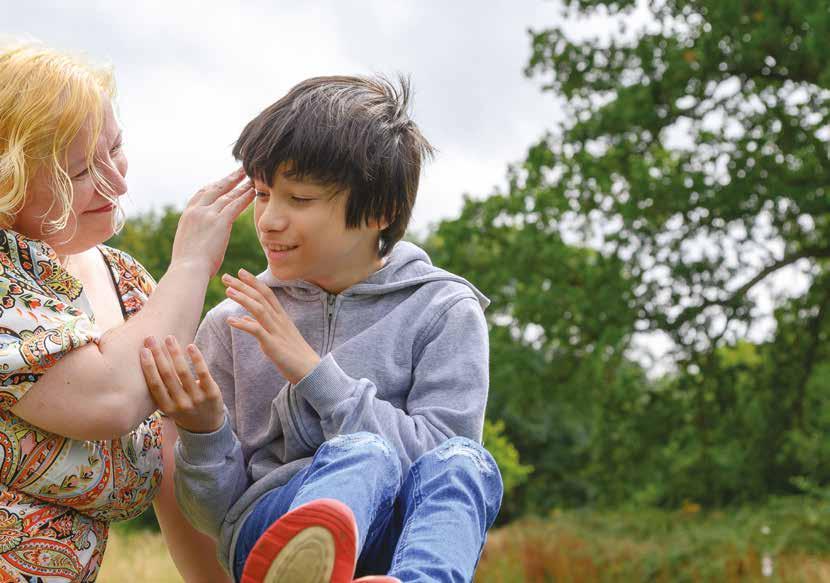
Real life Autumn 2022 13
was increased, and the judge also ensured that Diego’s EHCP would have paediatrics OT support.
About the current neurodiverse movement
When professionals suggested I look into autism after pre-assessing Diego, I did exactly that. One of the first websites I came across was ‘Autism Speaks’. However, they had a particularly fatalistic take on autism that deeply depressed me, so I tried to find alternatives. Not long after, I came across the Autistic Self Advocacy Network, which presented a much more positive outlook on autism. For me, the idea of autistic people self-representing was a powerful one.
Sadly, barely a year later, I started to see the cracks in the movement. Worst of all, when I started to raise my concerns around the subject of non-verbal autistic individuals, such as my child, I was called an ableist, Nazi, and bigot by most activists on social media. When I mentioned my child is non-verbal, they immediately thought I used Applied Behaviour Analysis with him. When I tried to explain my child’s struggles, they would make damaging
statements such as “that’s not autism”, or “your child is too severe to be autistic”. Or they simply denied that people like my child existed at all in their community. Many claim that autism is not a disability; that it is a gift or a superpower. I can respect people who think like that, but the issue is when they speak for everybody within the community. Or, even worse, when they exclude parents and carers of these autistic people from the neurodiversity movement.
Over the years, I saw a movement that should have empowered all autistic people. It should have focused on autism awareness and rights instead of fighting each other, and parents and carers of the most disabled (as if our families didn’t have enough struggles). It took me some years to realise these movements didn’t care for my child or any autistic person like my child. They only cared about their ideology. Many parents, and even other autistic self-advocates, who thought the same way as me, were silenced on social media. Parents like me, who are already overwhelmed by the current system and the unfairness of it, now have to fight with those who are supposedly representing our children.
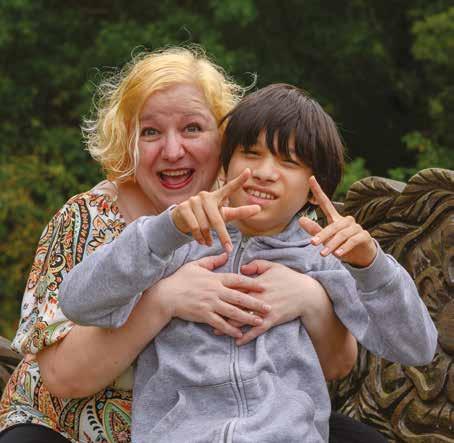
Frustrated by all this, I created a Facebook page called High Needs Autism. It has grown so much and, currently, I have 1,000 people who like the page. I was inspired by many others who are speaking out against this harmful ideology on social media, and it seems we are finding our voices again.
My dream would be a world where all autistic people matter, regardless of their capabilities or skills. A world where everybody gets the support they need to thrive. Where all autistic individuals try to understand each other and their different struggles. In my opinion, it is not too late to achieve this. I wish we could be united for the rights of all autistic people.
14 Your Autism Visit facebook.com/ HighNeedsAutism
Real life
Offering inspirational education for young adults with Autistic Spectrum Conditions between the ages of 16 and 25, Beechwood College in South Wales is currently accepting enquiries for new student placement assessments.
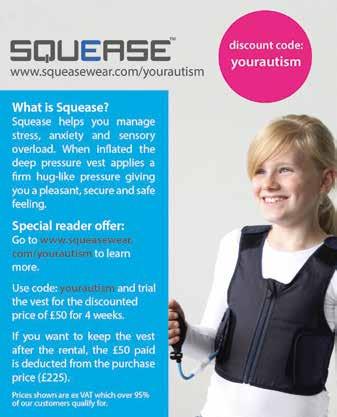



Regardless of ability, we believe every student leaves Beechwood College with greater confidence having acquired a range of skills which allow them to transition successfully into the wider community.

Creating confidence and self-esteem
Our multidisciplinary team of education specialists, therapists and care staff ensure our students are supported to access meaningful learning opportunities in a way that takes account of their unique learning style and the impact their ASC has upon them.
To find out more about Beechwood College go to our website www.beechwoodcollege.co.uk
Or you can contact our Admissions Coordinator by phoning 029 2053 2210 or emailing referrals@beechwoodcollege.co.uk
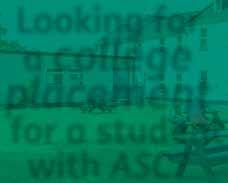
“Stand-up is the only time I feel comfortable”
Comedian Fern Brady tells us about being diagnosed last year, how being autistic influences her comedy, and taking on Taskmaster

You were diagnosed in 2021 – why did you seek a diagnosis?
I knew I was autistic when I first read up on it at 16 (my special interest at the time was the DSM manual). And my partner had been pushing me to get help. Unfortunately, I have a pretty intense distrust of NHS GPs and psychiatric services, so that really got in the way of getting a referral. Then, during lockdown, the massive disruption to my routine meant my meltdowns got ten times worse, so I was basically forced to get a diagnosis.
How did you feel when you were diagnosed?
I felt really, really depressed and I actually wished I could take it back. The permanence of it was really devastating. I got it into my head I’d never have normal friendships. As part of the diagnosis, they interviewed my mum. I found out about all this very autistic stuff I’d done from when I was a baby. It just made me grieve for the fact I’d been raised not knowing any of this and thinking I was a bad person. The Lorna Wing Centre, who diagnosed me, were incredible but, when you get diagnosed, there should be an automatic referral to postdiagnosis counselling.
© Raphaël Neal
Interview 16 Your Autism
Autism is often missed in women and girls. Why do you think that is? Medical misogyny. I am so clearly autistic, and if I self-diagnosed at 16, how on earth did doctors not put together my physical problems as being part of autism? From when I was little, I was presenting to the GP with scratches on my arms from stimming. I only found out recently that, when the book The curious incident of the dog in the night-time came out, my mum told my brother she thought I was autistic. But she’s from a generation where it wouldn’t be a good thing to get a diagnosis. Then I had the classic autistic girl thing of having a big breakdown in high school, and there was just no joined-up thinking on it from doctors or teachers.
I think girls are misread more than boys, and people are more inclined to interpret women’s behaviour in bad faith. When I tried to get my NHS referral, it was through a phone consultation with a male GP who’d never met me. After 10 minutes, the guy said flippantly: “Maybe you have a borderline personality disorder [BPD].” He just threw that out there as if it was nothing. I knew that was his way of saying I was difficult. I don’t even remotely fit the profile of a borderline personality! To me, the description of a borderline woman reads like a neurotypical observing an autistic woman using neurotypical standards to interpret her actions. After this, I got in touch with the Lorna Wing Centre because they specialise in diagnosing women. I know now that huge numbers of autistic women are misdiagnosed as BPD and are sent off to internalise the stigma of a personality disorder they don’t have. It makes me so angry.
I do, but there are so many variables.
Like if I’d been diagnosed as a child, my parents would have been even more overprotective. My schools were awful so they might have underestimated me academically. As it was, all the eccentric behaviour I displayed in primary school made them think it was because I was a child genius. I got put in a special class with this other kid who was actually a genius. Then the family narrative about me was that I was very weird but very clever. Having said that, if I’d been diagnosed, I like to think I’d have had fewer suicide attempts and wouldn’t have ended up in a child and adolescent mental health unit at 16, being treated for an obsessive compulsive disorder I didn’t have.
What is being autistic like?
I have sensory issues related to noise, light and touch, which I’m learning to deal with. I can’t read when people are joking or teasing me, which is awkward if you’re a professional comedian. I often have no clue what’s going on in social situations, as it sounds like I’m listening to 20 radio stations at once. I used to feel pressure to socialise or go to parties, even though it made me really anxious. I didn’t realise until I got therapy that my meltdowns were directly connected to trying to hide all this stuff, and the more I tried to
act like I wasn’t autistic, the worse things would be for me.
If it hadn’t been for the meltdowns, I may not have bothered getting diagnosed. It’s taken me a good 18 months of recording the reasons for meltdowns to get them down to one or two a month. I worked so hard to keep them secret, and it feels like other openly autistic women tend towards shutdowns more. I really want more people to know about meltdowns as they’re horribly misunderstood. On a more positive note, I get to travel the world alone, doing what I love.
How did you get into stand-up? I’d been wanting to do it from the age of 20. But everyone looked at me like I was mad. Then, when I was 23, a magazine I was interning for at the Edinburgh Fringe got me to write an article where I tried stand-up, and that was the push I needed to get into it. After the first gig, I just started showing up at comedy clubs and making them put me on.
How has being autistic influenced your comedy?
I love spotting patterns and pointing out the inconsistencies between what people say and what they do. I think neurotypicals’ worst trait is their obsession with doing stuff for social approval and saying stuff thoughtlessly, and it’s enjoyable to pull them up on that. My comedy is consistently described as blunt and
Do you wish you’d been diagnosed sooner?
My comedy is described as blunt and brutal, but we all know that’s because non-autistic people treat honesty as some sort of magic trick
Autumn 2022 17
Interview
brutal, but we all know that’s because non-autistic people treat honesty as some sort of magic trick.
Any advice for autistic people looking to get into comedy? Lean into your autism. If you love repetition, monologuing at people, and being alone a lot, then stand-up is the perfect job for you. There are a lot of us in stand-up. You’re mostly in a dark room, you stand side by side with other comics staring at the stage instead of having to make eye contact. Then you can go on stage and talk about your interests and (most of the time) there’s an unspoken agreement people will listen. For me, it’s the only time I really feel comfortable in a room full of people.
What prompted you to write your book Strong female character?
After my diagnosis, I started connecting with other autistic people and exchanging advice. It made me so happy that I wanted to do more. I thought it was both messed up and inspiring that the majority of useful
information I got post-diagnosis was not from a GP or mental health professional, but from 19-year-old autistic girls on Instagram. I wanted to be part of the growing movement of radical autism acceptance.
I’d noticed that, with the exception of Hannah Gadsby’s excellent book Ten steps to Nanette, the latediagnosed autistic women canon was dominated by middle-class women. I thought: what book do I wish existed when I was 21? It frustrates me that the only reason I got diagnosed and got such good therapy is because I have the money to do so, but it was still a profoundly lonely and isolating experience. I wanted to pass on what I know to people who are self-diagnosed or stuck on lengthy waiting lists.
How did you prepare for Taskmaster?

There’s not really anything you can do to prepare. I hadn’t seen the show before, but a lot of people tagged me on social media asking me to go on it. Taskmaster was a surprise revelation in letting me be totally myself. It’s ended up being the best thing that’s happened to me in terms of accepting my autism because I decided to be totally myself.
Watching myself being autistic on Taskmaster and the audience laugh along with me was like the final step in accepting my autism and being more compassionate towards myself.
You’re touring with Autistic Bikini Queen – what can we expect from the show?
Almost none of it is explicitly about autism, but all of it is stand-up delivered from an autistic perspective. My stand-up is pretty dark and dirty, though, so please don’t bring your autistic kid for inspiration or anything. That’s happened before.

Taskmaster was a surprise revelation in letting me be totally myself
© Raphaël Neal
18 Your Autism Interview Fern is taking part in the Matt and Co Comedy Show on 14 November. Book tickets at autism.org.uk/mattandco Find out more about Fern at fernbradycomedian.com Strong female character will be published in February 2023. Read more about our Lorna Wing Centres at autism.org.uk/ diagnosis
In your own space and time, making precious memories to treasure
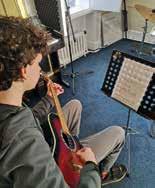


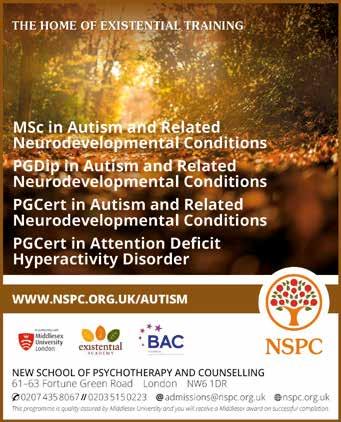

A closer to nature experience with a low carbon foot print, campfires with marshmallows, animals to pet and care for, high quality local produce to enjoy and a homely rustic feel. A camping holiday without the hassle and some extra luxury to help you relax. So comfy you may forget you are in a tent…

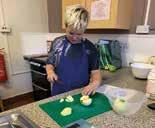





Leafy Fields, Ingleton Farm, Ashill Moor, Ashill, Devon EX15 3NP
Call us today: 0784 232 0981 Email: leafyfieldsglamping@yahoo.com
Use code: #glamping23 to get 5% discount Exceptional Schools for Young People with Autism Alderwasley Hall School & Sixth Form, Derbyshire Aran Hall School, Dolgellau Bladon House School, Staffordshire Maple View School, Derby Pegasus School, Derbyshire Rowden House School, Herefordshire Senadgroup.com Tel: 01332 378840 SENADgroup
“Feeling happy in a role for the first time is phenomenal”
Meet Max, a Service Desk Professional at BT, who got the role through our Autism at Work programme. We chatted to Max about his job and the support he receives

Autism at Work has been kindly supported and made possible with thanks to the Bloomfield Trust.
Before the Autism at Work programme, were you in employment?
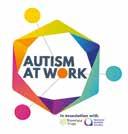
I was struggling in my previous role and it didn’t work out well, even after my autism diagnosis in 2020. After that, I was looking for work for a few months before finding the Autism at Work programme.
How did you get involved with Autism at Work?
My mum told me about the programme, which led to an introductory call with Susan (Employer Engagement Manager at the National Autistic Society). Susan was really lovely and introduced me to the opportunity at BT. She explained the role, the application and interview process, and made sure I was happy with everything.
Next, I had an introductory call with BT and they offered to show me the office. I found talking through the role very helpful as it gave me a feel for the job before even going to the interview. This would make a huge difference to a lot of autistic people.
20 Your Autism
Work
How do you think autism affects you in the workplace? Both positives and not-so positives?
Positives – I like to drill down to the details and hyper-focus on something.
I tend to do one thing at a time – if I try to do more than one, I will struggle a bit. But if I focus on this one thing, I can really delve into the small details. In terms of difficulties, if there is a lot coming through then it can get a bit much.
How has the National Autistic Society supported you and your employer?

I have a call with my job coach, Leo, once a month. We talk about my progress and any difficulties I am experiencing. Leo also has monthly meetings with my manager. This level of support has been amazing.
The National Autistic Society also held training sessions with my managers and colleagues, and a lot of people attended. I think it’s helped make things easier for my colleagues. It has allowed them to understand why I may not be very sociable in a big crowd of people, although I enjoy one-on-one conversations.
And how are you finding your role now? Are you enjoying it?
I am really enjoying it. My team deals with the connections between big cities and diagnosing faults. It’s great because we are able to work at our own pace and can truly collaborate with people from other teams. The role is autism-friendly. It’s the first time I haven’t had to make masses of my own adjustments in a role.
The office is great, too. There are lots of rooms. If I get overwhelmed, I can easily work in a different room. I’ve only had to move on a handful of occasions, but it’s good to know I have the option.
Most of all it’s nice to be able to focus on the work, rather than worrying about struggling in a role. I’m looking forward to getting fully trained up on everything. My long-term goal is to learn skills for a planned new system at BT.
What advice would you give to your younger self?
Go to the National Autistic Society because they will help you big time. I found a job where I would gladly stay for the rest of my working life, quite a feat on their part. Feeling secure and happy in a role for the first time ever is phenomenal. I can’t thank the National Autistic Society enough for that.
If you hadn’t found this role through the Autism at Work programme, what do you think you would be doing? I would have kept applying for other roles. I definitely would have been open about my autism to any employers. But here, I don’t have to do that. I can just get on with the job.
For information about our Autism at Work programme and current opportunities, visit autism.org.uk/work
Like to be featured here, talking about your job or volunteering role? Email YourAutismMag@nas.org.uk
Work Autumn 2022 21
Late diagnosis in women and girls
We examine the issue of late diagnosis for women and girls, and how our charity is addressing it, while Faye and Dawn share their personal stories
22 Your Autism Diagnosis
Diagnosis
New research by Swansea University has found it takes, on average, six years longer to diagnose autism in women and girls than in males. A study of 400 participants found that 75% of boys received a diagnosis before the age of 10 – but only 50% of girls. It also found the average age of diagnosis in girls was between 10 and 12 – but between four and six for boys.
Steffan Davies, who carried out the research, told the BBC that there was a marked impact on the girls’ mental health while waiting for a diagnosis.
Dr Sarah Lister Brook, Clinical Director at the National Autistic Society, agrees. She said: “Every autistic person is different but women and girls can be better at ‘masking’ what we traditionally think of as the signs of autism.
“It means many still go through their lives without a diagnosis, not having a full understanding of who they are.
“A diagnosis can be life-changing and vital to getting timely care and support. Gender should never be a barrier to diagnosis and things are changing, in part thanks to autistic adults such as Christine McGuinness, Melanie Sykes and Holly Smale talking about their autism. But we still need better understanding.”
Addressing the gender divide
Women and girls training module
Developed with autistic women, our charity’s Women and girls training module aims to support professionals to identify autistic women and girls. It is specifically aimed at diagnosticians, but was developed to be useful to anyone with an interest in autism, including autistic people, parents, carers and other professionals.
Research has highlighted the challenges in identifying autism in women and girls. It is often said that the differences that autistic women and girls experience are of a subtler presentation, or it may appear that way to others.
Some autistic women and girls mask their autism to try and hide the fact that they feel different. This is also a major
Dawn’s story
From Year 3-7 in school, we were told our daughter was “fine in school”, “not autistic”, and to “stop lying”, as well as “you’ll never get an EHCP (Education, Health and Care Plan)” – all because she was masking.
Because of this lack of understanding, we obtained a private assessment just to get our child’s voice heard. We were refused an EHCP assessment, but that was overturned when we evidenced her daily unmet school needs. She was pushed to breaking point mentally, and developed OCD and very high anxiety. Now she is in an independent autism-specific school with an individual timetable. We have begun the road to recovery.
At 41, after extensive research, books and courses, I proudly self-identified as autistic. And I’ve just been diagnosed as autistic. That’s after a lifetime of anxiety, depression, panic attacks and an eating disorder. I finally know my purpose in life. Soon, I’ll start a psychology degree to gain a Master’s in Autism for our children’s acceptance.

barrier to clinicians recognising autism and understanding the experiences of autistic women and girls.
This training aims to help professionals to better recognise autistic characteristics amongst women and girls. Completed by more than 20,000 people in the past three years, it continues to receive brilliant feedback.
The Women and girls training module is available at autism.org.uk/women-andgirls and costs £33 + VAT to access.
Thank you to the Pears Foundation The Women and girls module was made possible through our partnership with the Pears Foundation. As well as their support for our own activities, the Foundation is a significant funder of the sector, and we would like to thank Sir Trevor Pears and everyone at the Pears Foundation for their commitment to making the world a better place for autistic people and their families to live.
Dawn
Autumn 2022 23
iStock .com / Annaspoka
Our new campaign
This autumn, we’re running a campaign on the issue that women and girls and nonbinary people are often undiagnosed, or diagnosed very late in life.
The campaign is about empowering autistic women and girls and non-binary people to share their own stories, and to use our advice and guidance, online community and women’s online groups. It will challenge gender bias, amplify autistic women’s voices and celebrate their successes.
We are very excited that celebrity photographer Rankin has mentored Alex Heron, an autistic female photographer, to take photos for this campaign. Look out for it in October!
Faye’s story
Aged 34, I was diagnosed as autistic. This transformed my life and allowed me to be my true self after years of questioning why I felt like an alien on the wrong planet.
I had no idea I was autistic until a close friend, a headteacher, told me I was the most autistic person she knew.
I somehow knew I was different.
As a child, I was most content being alone surrounded by nature. I was obsessed with Tina Turner. Prehistoric life was a subject I could immerse myself in. I could quote my favourite TV shows line for line.
School was a challenge, and I tried everything to stay at home with my mum. I was regularly ill, but was thought to be ‘crying wolf’. In reality, I was a child suffering from severe anxiety.
As I got older, I thought I needed to blend in and that life would be easier. Of course, this was not the
case. I was unaware I’d spent years masking, and this impacted my health immensely. I always had a bug, headaches and felt drained.
When I researched autism, I realised I ticked many boxes. The moment I was diagnosed, it was as if all my questions were answered and a massive weight was lifted. Three years on, I’m still learning how to live without my ‘mask’, but old habits die hard. But in many areas of my life, I no longer hide Ethel (this is the name I have given my autism). I can be free to be myself. My health has improved. I have a TikTok and Instagram page (@prehistoricmodels) where I share my passion for dinosaurs.
If I had been diagnosed sooner, I would have got the reasonable adjustments I needed to function at school. I would have pursued a career in palaeontology as I would have had a reason – and almost a
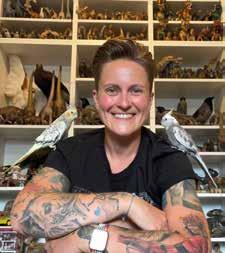
justification – for wanting to do something out of the ordinary.
And I would have simply been myself rather than portraying a person society expected me to be.
I tell anyone I can I’m autistic because it might just change someone’s perception. It may also help to show a child who feels like an alien, but doesn’t know why, that it’s ok to be their true self.
24 Your Autism Diagnosis
iStock .com /markOfshell
For Healthy and Happy Feet
Orthopaedic Sensory Floor Mats for all Ages
There’s nothing better for young feet than walking barefoot, whenever it’s safe. With our Orthopaedic Sensory Floor Mats we bring natural surfaces to the safety of your home so your little one can enjoy walking barefoot anytime!
The specially designed surfaces of the sensory play mats perfectly mimic natural surfaces, providing the benefits and pleasures of walking barefoot on real world surfaces like Grass, Pinecones, Roots and Logs to list just a few.
BENEFITS:
Sensory stimulation
Deep Pressure Stimulation
Provide prevention from flat feet

Significant correction of flat feet problems
Improve proprioception, balance and posture
Strengthen the muscles of the feet
Gross motor stimulation
Boost the immune system = less illness
Improve sleeping habits
Reduce tiredness
Improve blood circulation
Feet massage – improving depression and anxiety
✔ With our sensory mats your child will learn and develop as they play.

✔ Give your child the best start in life and set them up with our sensory play mats.

✔ Sensory stimulation optimises development in children. Improving sensory stimulation through the feet can have an immediate impact in posture, balance, and gait.
✔ Play Mats were design to activate brain through the feet.
✔ Barefoot stimulation is a key to correct postural development.

CONTACT US: hello@happyfeetplaymats.co.uk or visit www.happyfeetplaymats.co.uk


A lifetime of care
Mike has been in our charity’s care all his life. After attending Sybil Elgar School in the 1970s, he moved to our residential services, where he still lives.
As we look back over 60 years of the National Autistic Society, his mother
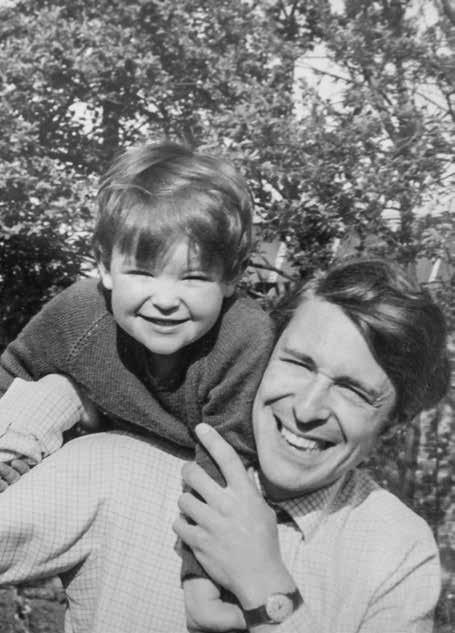
Fiona tells his story, and why she is leaving us a gift in her Will
Mike is autistic and has never spoken at all. He was born in 1967 in Southampton and has two younger sisters, Christine and Susan.
At the time Mike was diagnosed, understanding of autism was in its infancy. There were educational psychologists with ‘theories’. They sometimes thought autistic children were repressed by their parents, and all they needed was to be released! This didn’t make things any easier for us.
Mike was diagnosed when he was nearly three by child psychiatrist Michael Rutter. His father David and I originally took him to the deaf clinic in Southampton (doctors thought Mike may be deaf). A young psychiatrist there suggested we contact Dr Rutter at the Maudsley Hospital. It was Dr Rutter who recommended us to Sybil Elgar at the Ealing School. We have been so lucky all along.
So Mike went to the Sybil Elgar School in 1973 when he was six years old. He is the little boy with Sybil Elgar, with his back to the camera, in the recent film about 60 years of the National Autistic Society.
Communication
From a young age, Mike was able to recognise and follow hand gestures. Later, at Sybil Elgar School, he was taught various types of sign language and was able to interpret this.
However, communication has been a constant issue. Our desire to communicate has not always been matched by his. Mike has learnt various sign languages: PagetGorman, Makaton, BSL and so on. He understands them all, but shows no keenness to use them.
Mike and his dad
26 Your Autism History
Phone messages were enjoyed for a time, but when the phone became more advanced, he deleted everything. It was almost as though he resented the possibility of his world being broken into. We have learnt to read the signs – head rubbing, which can express joy or frustration, and biting of his hand or arm when upset. When he’s really unhappy, many more autistic mannerisms become apparent.
We wish we could understand how Mike thinks, but he has no speech and only a very limited understanding of spoken words.
We do know that Mike is a mathematical savant. He can multiply two six or seven-digit numbers in his head, and can recognise huge prime numbers and factorise them where possible. He was the subject of a study by two London University students, featured in the book Bright splinters of the mind by Beate Hermelin. He is also a calendrical calculator, meaning he can quickly name the day that a given date falls on.
Adult life
Mike stayed at Sybil Elgar School until he was 19, and then he moved to Somerset Court.
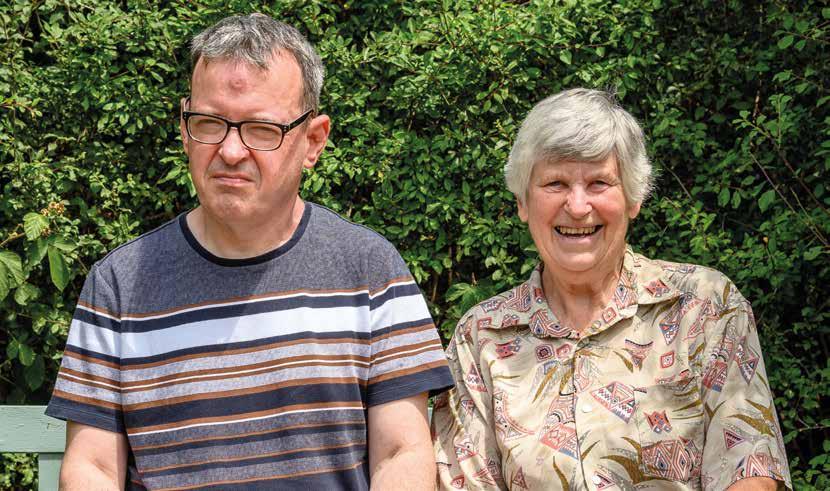
In 1999, he moved on to the Cherry Trees residential service at Burnham-on-Sea, where he still lives. He seems to be very happy there.
Mike displays all the usual emotions: anger, fear, joy, laughter, but it is not always possible to understand the cause. It’s hard to tell how he feels about other people. Who are the most important people to him? He has lived with the same residents for more than 20 years. Some are liked more than others, but does that denote friendship?
We wish we could understand how Mike thinks, but he has no speech and only a very limited understanding of spoken words
Mike and Fiona
History Autumn 2022 27
History
He has seen staff come and go, and probably learnt not to set too much store by such relationships. The only long-term relationships are with family members, and he expresses excitement when we collect him from his community.
When David was a vicar in Enfield, one of his regular duties was interviewing young couples getting married in his church. Occasionally couples would arrive at the family home before David and were shown through to David’s office. The couple were then treated to a mischievous practical joke by young Mike, who would, quick as a flash, flick the light switch off, plunging the already nervous couple into darkness! Mike would take great joy in this, and we think it shows his sense of humour.
Routine is always important to Mike and he becomes very upset by an accident or spillage. However, unlike some autistic people, he enjoys change and new situations. He has been with us to Kenya, the USA and the Canaries, and on family holidays to Italy and Spain. For Mike, flying is the best bit!
Mike loves walking, and he enjoys following maps. He and I have walked the whole of the southwest coast path, from Minehead to Poole, staying in 28 different B&Bs on the way. We are currently walking on parts of the Pembrokeshire coast path.
Mike’s sisters enjoy walking, and often join Mike on long walking trips. Both Christine and Susan have been warm towards Mike
from a young age, and while it wasn’t always easy, feel that they have benefited from having an autistic brother – as have their own children, who are very fond of their uncle.

A special gift for a lifetime of care
I am so, so grateful for all that the National Autistic Society has done for Mike. David and I first joined the organisation in 1970 when Mike was diagnosed. We were not founder members, but we knew some of the people who were.
I have always felt strongly that I would like to show my gratitude to the National Autistic Society for everything it has done for my family. That’s why I have included a gift in my Will to the charity so that other autistic people like Mike can benefit from its expertise and care, too.
Read more about our 60th anniversary at autism.org.uk/timeline
For more information on leaving a gift in your Will, visit: autism.org.uk/Will
 Mike with Rich, his keyworker, on the beach
Mike at Sybil Elgar School
Mike with Rich, his keyworker, on the beach
Mike at Sybil Elgar School
28 Your Autism
Safety
Join us for the TCS London Marathon 2023.







Apply to be part of Team Autism at one of the world’s most popular marathons and help to create a society that works for autistic people.
www.autism.org.uk/londonmarathon2023
If you are looking for a unique race, join us at London Landmarks Half Marathon 2023. Live music, theatrical performance and iconic London landmarks along the route!

www.autism.org.uk/landmarks
The National Autistic Society is a charity registered in England and Wales (269425) and in Scotland (SC039427)























Readers to the rescue!
Do you have a problem our readers can solve? Get in touch and benefit from the experience of your fellow members
Post your problems or answers on Facebook at the National Autistic Society members’ group or email YourAutismMag@nas.org.uk
QHow can you negotiate the benefits system on behalf of your autistic adult child? My son has burnout and refuses to engage with the process.
Anonymous
ASociety and the benefits process have a belief that, once you reach 18, you can manage your own affairs. Far from it. As your child moves into adulthood, you have to find a way to support them. It’s not easy. The simple fact that you want to act for your son is met with mistrust.

For extensive information and guidance about autism, visit our website: autism.org.uk
Our experience has been the same as for your son. Initially, talk to your local carers’ support group. They are often linked to an understanding solicitor, who can advise on what benefits your son would be entitled to and guide you through the application process.
Look into being registered with your local authority’s adult care department, and have a full needs assessment for your son, as well as a carer’s assessment. You should also have a local NHS Community Team for Learning Disabilities. Make use of these organisations, as they often have knowledgeable and sympathetic people who will support you and your son.
Have you discussed power of attorney with a solicitor? This will give you the legal right to act on your son’s behalf. If your son receives some benefits from his childhood, you may already be regarded by the Department for Work and Pensions as his ‘appointee’. Before meetings, try to call ahead to explain your son’s position and request flexibility. Will they allow an advocate to accompany you? Having someone at your side can remove any doubt of you ‘making it up’, which is always a fundamental fear of benefits agencies.
Paul Fraser
Thank you for your great advice, Paul. You win a copy of The autism and neurodiversity self advocacy handbook –Developing the skills to determine your own future by Barb Cook and Yenn Purkis.
Help me next!
I am finding it difficult when my child has a meltdown outside, as I am on my own with her. She runs away, screams and tries to hit me if I go near, but also puts herself in dangerous places. I feel so useless and stressed, as she won’t listen. Any advice welcome.
Anonymous
Your Autism
Send us your solutions for a chance to win a copy of The kids’ guide to staying awesome and in control: Simple stuff to help children regulate their emotions and senses by Lauren Brukner.
By writing to us with either a problem or an answer, you give consent for your letter to be published. We reserve the right to edit submissions.
Adene Sanchez
30 Your Autism
iStock .com /
These sessions are
ONLINE CPD SESSIONS FROM EQUALS FOR PUPILS WITH PMLD, SLD AND MLD
of
Thursday 6th October Logically Illogical – Information and insight into Autism by Ros Blackburn
Tuesday 18th October An Introduction to Autism with Dr Lila Kossyvaki
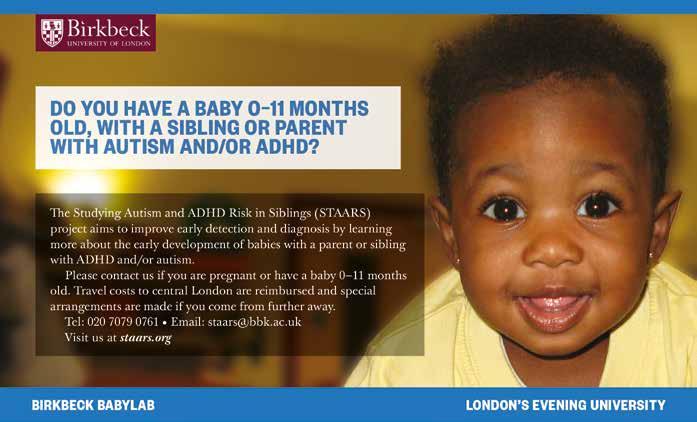
for
Members
the
sessions.
Tuesday 31st January Play for Children with Autism with Dr Lila Kossyvaki
In this session the audience will be introduced to the importance of play in the life of children with special attention to autistic children, how play is likely to look like in these children and how adults can support it.
The audience will be introduced to some facts and myths about autism, the main areas of difficulties autistic individuals are likely to face as well as ideas for school provision and teaching strategies.
Tuesday 1st November Formal Curriculum with Peter Imray
Attempts to answer the problems facing learners and the teachers of those learners who are working consistently and over time below age related expectations in the primary phase. There is a special (but time bound) emphasis on teaching Mathematics and English to those who struggle enormously with both, as well as an in-depth analysis of why this is so.
Thursday 9th February Autism and Communication with Dr Lila Kossyvaki
In this session the audience will be introduced to some of the main communication difficulties autistic children are likely to face and also be provided with several hands-on ideas on how to support communication in these individuals.
All of these online training sessions will run from 15:45 until 17:15
To view all the online training courses visit www.equals.co.uk
To book onto any of
sessions or to find out more please visit www.equals.co.uk
EQUALS is committed to improving the lives of children and young people with learning difficulties and disabilities through supporting high quality education.
FREE
charge
EQUALS
to attend
live
the
or contact admin@equalsoffice.co.uk Tel: 0191 272 1222
How
I… get help with the cost of

32 Your Autism Advice As the cost of living crisis continues, we look at the help available
do
living?
One-off energy payments
The Government is giving every household in England, Scotland and Wales £400 off their energy bill. The money will be paid in six instalments. Households will see a discount of £66 applied to their energy bills in October and November, and £67 a month from December to March 2023.
If you pay by direct debit or by card, you will see an automatic deduction off your bills. If you have a ‘smart’ prepayment device, you will see an automatic monthly top-up added to your account.
Do you have an older ‘non-smart’ prepayment device? You will receive an energy bill discount voucher in the first week of each month, via text, email or post. You will have to redeem these in person at your usual top-up point, such as a local Post Office.
Extra payments if you get benefits
The Government is giving you a £326 ‘Cost of Living Payment’ automatically if you get any of the following:
● Universal Credit
● Pension Credit
● Working Tax Credit
● Child Tax Credit
● Income-based Jobseeker’s Allowance
● Income-related Employment and Support Allowance
● Income Support
If you get Working or Child Tax Credit, you’ll get your Cost of Living Payment in autumn 2022. If you get another one of the other benefits, you should have received your Cost of Living Payment on or after 14 July 2022. You will only get one Cost of Living Payment, even if you are claiming more than one benefit.
To get this payment, you must have been paid your benefit on or between 26 April 2022 and 25 May 2022, or started a successful benefit claim by 25 May 2022. If you’re applying for Universal Credit, you won’t get the Cost of Living Payment until your benefits claim is successful.
The Government has said it will send a second Cost of Living Payment in 2022. If you get Working or Child Tax Credit, you’ll get your second payment in winter. If you get one of the other benefits, you’ll get your second payment in autumn.
If you’re not claiming any of these benefits yet, check if you can claim at bit.ly/benefits-calculator. It’s worth starting a claim as soon as possible if you are eligible, because you might be able to get the second Cost of Living Payment.
Those receiving disability benefits
The Government will have automatically given you £150 in September 2022. You’ll get this payment if you get any of the following benefits:
● Disability Living Allowance
● Personal Independence Payment
● Attendance Allowance
To get this payment, you must have
As part of the Disabled Children’s Partnership, our charity wrote to Liz Truss and Rishi Sunak in the summer to call for greater support for autistic people and their families during the cost of living crisis.
been getting one of these benefits on 25 May 2022 or have applied for one of these benefits by 25 May 2022. You won’t get the payment until your claim is successful.
Check if your local council offers help
Your local council might provide some help to pay for things such as your energy and water bills, food, and essential items such as clothes or an oven. This help is known as ‘welfare assistance’ or the ‘Household Support Fund’. Each council runs its own scheme. The help they offer and who can get it varies. Find out how to contact your local council at gov.uk/find-local-council
You don’t have to be receiving benefits to get help from your local council. If you do get benefits, they won’t be affected if you start getting money from a welfare assistance or Household Support Fund scheme.
Thanks to Citizens Advice for providing this information, which was correct at the time of going to press on 6 September. The Government may announce new measures – check citizensadvice.org.uk for updates.
Scope offers advice on coping with the cost of living crisis at scope.org.uk. Mencap has produced an easy-read guide at www.mencap.org.uk
For information on applying for benefits, visit autism.org.uk/benefits
Advice Autumn 2022 33
iStock .com / andresr
Distressed behaviour at school
Abbie Woodling from our Education Rights Helpline explains how parents and staff can help children showing distressed behaviour at school
Distressed behaviour is often referred to as ‘challenging behaviour’. However, in some cases, autistic pupils can become so overwhelmed at school that they can’t control their behaviour. Others can misinterpret this as them being naughty or disruptive, when in fact they are extremely distressed.
There can be serious consequences of distressed behaviour. It can lead to school refusal/phobia/anxiety – where children won’t or can’t go to school. Pupils may receive disciplinary sanctions after showing distressed behaviour, such as fixed term, permanent or informal exclusion.

Advice 34 Your Autism
Possible causes of distressed behaviour at school include:
● high levels of stress and anxiety
● inadequate Special Educational Needs (SEN) support
● difficulty coping with school environment
● problems with friendships and social anxiety
● bullying
● difficulty coping with curriculum or timetable demands
● sensory overload – noise, smells, lights, busy school environment
● transitions – changing classroom, different teachers, unstructured times
● being away from familiar routines, family and home
● difficulty with a particular staff member or subject

● difficulty processing instructions and understanding requirements.
2. Understanding difficulties
Government guidance on exclusion states: “Disruptive behaviour can be an indication of unmet needs.
Where a school has concerns about a pupil’s behaviour, it should try to identify whether there are any causal factors and intervene early in order to reduce the need for a subsequent exclusion.”
It’s not always clear what has triggered distressed behaviour, which makes it difficult to identify useful strategies. However, these measures may help school staff or parents to find out what is causing the behaviour:
● Keep a behaviour diary to try to recognise when anxiety or frustration occurs and any patterns.
● Use visual supports.
● Get help from any member of staff who knows the child well.
● If possible, talk to the child about what help and support they would like. Use a home/school communication book.
● Look out for masking.
● Consider how autism may present differently (such as in girls).
Action plan
1. Putting SEN support in place
Statutory government guidance on exclusion states: “Early intervention to address underlying causes of disruptive behaviour should include an assessment of whether appropriate provision is in place to support any SEN or disability that a pupil may have…”
The school should help identify, assess, meet and review your child’s special educational needs. They should carry out an individual assessment to understand barriers to and gaps in your child’s learning.
They should then consider how those barriers can be overcome, put their solutions into action and regularly review progress.
Schools or parents can also request an Education, Health and Care (EHC) needs assessment from the local authority. This is a detailed exploration to find out what a child’s SEN are and what provision should be put in place to meet them. It may lead to an EHC plan, which is for children and young people aged up to 25 who need more support than is available through SEN support.
● Create a worry book for the child to record anxiety during the school day.
● Identify strategies to regulate emotions and reduce stress: visual stress scales, exercise, favourite activities.
● Identify sensory differences and consider how the physical and sensory environment impacts on learning.
● School staff should not insist on eye contact or verbal communication when the child’s anxiety is heightened.
● Arrange for a trusted member of staff to be available to the child.
● Arrange specialist input from a
Autumn 2022 35
iStock.com/ sturti Advice
Progress at last
Safe and private 1
Memberships fromjust £100peryear!









introductions
Social events and workshops

Private and secure mobile app Penpal matching service



And much more!
For more information, please visit
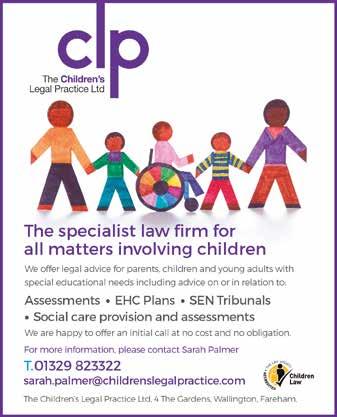
website www.nice2meetya.com
at hello@nice2meetya co

contact
07538 791
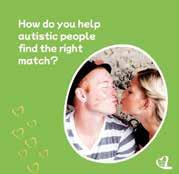
Struggling to clean their
simultaneously,
gentle clean
struggling with
toddlers teeth brushing and finally we’ve found a toothbrush that has helped.






teeth? Try the Oralieve 360° Toothbrush! The Oralieve 360° Child Toothbrush allows super soft bristles to clean multiple surfaces of the mouth
providing a
for sensitive mouths. hello@oralieve.co.uk 01582 439 122
Been
my
Lorraine W Receive 20% off our order with us by using code YOURAUTISM20 at checkout from our online store! www.oralieve.co.uk SM3315 Oralieve Autsim Half Page Ad 1 PRINT.indd 1 11/08/2022 11:12 n Hertfordshire s? nds? nship? Nice 2 meet ya is Hertfordshire's first dedicated friendship and dating group for adults with learning disabilities and/ or autism
We are a community support group and we help adults to develop and maintain new friendships and relationships
1
our
or
us
uk or
354 @nice2meetyaherts sabil t elationship us 91
professional, such as an educational psychologist, autism outreach, speech and language or occupational therapist.
● Provide an opportunity to discuss feelings at the end of the school day. Go through the timetable and ask them to score each lesson and explore results.
● Reward the child for any achievement, focus on praise and positivity.
3. Making reasonable adjustments
Once school staff know more about what is triggering distressed behaviour, they can put some reasonable adjustments in place.
Under the Equality Act, schools are required to make reasonable adjustments to avoid placing a disabled pupil at a substantial disadvantage compared with non-disabled peers.
A diagnosis of autism will generally be considered a disability
in accordance with the Equality Act
A tribunal ruling that challenged a loophole in the Equality Act means that schools must make sure they have made appropriate reasonable adjustments for autistic pupils, or those with other disabilities, before they can exclude them.

Reasonable adjustments could include:
● allowing the pupil to be met at the school entrance; providing time to engage in a special interest activity; or letting them leave before other pupils
● providing a quiet ‘safe space’ where the pupil can go when necessary
● allowing use of ear defenders, fidget toys, sensory equipment
● having support, or making alternative arrangements, for assemblies, school plays and sports days
● arranging support to enable the pupil to take part in school trips
● extra time, separate space, scribe, digital papers for exams.
Final note
An independent guide to quality care for autistic people (bit.ly/ autistic-taskforce), written by National Autistic Taskforce (wholly run by autistic people) makes some very useful recommendations for schools when responding to distressed behaviour. These include:
● Don’t label people as ‘complex’, seek to understand and empathise with their perspective.
● Do not remove choice and control from an autistic person.
● Modify the environment to meet needs, look for underlying causes not just triggers.
● Work with, not against, the autistic person – supporting them to manage stress and recover from distress.
● Support autistic people to find practical ways to meet their needs that minimise overall harm to themselves and respect the rights of others.
● Recognise when service policies, placement environments or particular staff are not the right match for an individual.
For further information and support with distressed behaviour at school, visit autism.org.uk/education
If you are having difficulty getting the support your child needs, contact our Education Rights Helpline at autism.org.uk/educationrights
Advice
Autumn 2022 37 iStock.com/ sturti
Notebook
Everything you need to read, do or see
Championing yourautistic teen at secondary school: Getting the bestfrom mainstream settings
AUTHORS: Debby Elley and Gareth D Morewood
PUBLISHER: Jessica Kingsley Publishers
PRICE: £13.76
VERDICT: A must-read, full of practical advice
If your child is going to a mainstream secondary school, this is essential reading. It offers a wealth of useful tips from those with lived experience.
Author Debby Elley is a parent of autistic teenagers. Gareth D Morewood was the SENCO at Debby’s son’s mainstream school, and is now the Educational Advisor for Studio III.
Some of the most useful tips are around choosing the right school for your child, by asking the right questions. For instance, is there a SEND team rather than a lone SENCO? Do posters talk mostly about behaviour and sanctions if pupils do something wrong? Are there quiet settings to retreat to or an alternative to eating in the canteen? The red flags, green flags and showstopper signs to look out for will really help parents to choose a truly inclusive school.
A lot of the book is about how to collaborate with the school from the start. The emphasis is on sharing information about your child early on to give staff all the information needed to understand them. When disagreements arise, there’s sensible and practical advice on handling them.
Several chapters cover common barriers for autistic pupils and how the best schools overcome them, such as allowing pupils to bring in comfort items to help with self-regulation.
The examples from Debby’s son Bobby are great. For instance, in the first fortnight of joining, she asks him about friends and if he’s met anyone he likes yet. “Not yet, I’m just trying to survive right now,” he reports.
Suzanne Westbury, Editor of Your Autism magazine
The railway woman short film
VERDICT: Bold, creative and entertaining
A new 13-minute video drama has been released online, raising awareness of young autistic people facing discrimination because of their gender.
The railway woman was created by filmmaker Toby Loxton and is about a young autistic woman, Alice, who has a passion for steam trains and has started volunteering at her local heritage railway. Alice reflects on her first day to senior railway worker Peter, and how it didn’t go as she had anticipated.
The young men Alice works with have a harsh approach towards her. Summer Clarke-Graham, who plays Alice, is autistic herself, and portrays the character well. What I like about The railway woman is how Loxton has combined his own experience of autism and railway interests into the film.
As someone autistic myself, I found the film to be bold, creative and entertaining. Loxton and his team did a great job of bringing the story to life, raising awareness of autism and the importance of accepting anyone who has special needs.
I highly recommend The railway woman as it addresses how young autistic people, of any gender, shouldn’t be put off doing a hobby they enjoy, as well as encouraging them to express their true feelings.
Watch The railway woman at bit.ly/railway-woman Max Ferreira, autistic author

Prize draw
We have a copy of Championing your autistic teen at secondary school to give away to a member. For your chance to win, please email your name and postal address to YourAutismMag@ nas.org.uk by 20 October, quoting ‘Championing giveaway’ in the subject line. The winner will be announced in the next issue.
The winner of last edition’s giveaway for a copy of A parent’s guide to autism diagnosis is Celia Brown Congratulations!

Autumn 2022 39









Autism and Music How Music Can Support Autistic Children and Young People 17th Oct 4.30pm Join our interactive, online Autism and Music training to discover how music can be used to support the development of social, communication and cognition goals BOOK NOW! Online training for just £35 Use discount code “AutismMag20” for 20% off! chilternmusictherapy.co.uk/ training-events/autismtraining Untitled-1 1 15/08/2022 14:30:07 The National Autistic Society is a charity registered in England and Wales (269425) and in Scotland (SC039427) Play today for your chance to win up to £25,000 each week. Each entry is just £1 Join now and help change the lives of over 700,000 autistic people and their families across the UK. Join online now: autism.org/lottery Or call our lottery hotline: 0370 050 9240
Eli’s story: What makes me, me!
AUTHOR: Tracey Lear
PUBLISHER: Blue Falcon Publishing
PRICE: £6.99
VERDICT: Highly recommended to explain autism
In this beautifully illustrated book, Tracey Lear explains autism from her son Eli’s perspective. He talks about seeing the world differently and the things that challenge him, such as working out his feelings. Everything is explained positively, including him liking
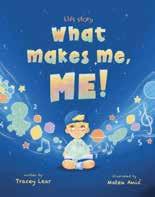
his own space and that if his emotions overwhelm him, it helps to take some deep breaths and count to 10. The overarching theme is that everyone is different and our differences make us who we are. A great resource for explaining autism to siblings and other children.
Suzanne Westbury, Editor of Your Autism magazine
Our six favourite… visual supports for school
2 Visual learning kit
Use visual worksheets, social stories and visual symbols to support understanding. Find a wide variety of visuals on Twinkl to support learning. twinkl.co.uk
3 Learning Resources Mathlink Cubes

1
PECS schedule board kit
Show children what will be happening throughout the day with a visual routine board. The PECS kit includes a finished box for when you complete activities. £24.37-£28.50 from pecs-unitedkingdom. com/shop/scheduleboard-kit

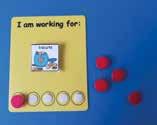
Great for supporting maths skills visually including adding, subtracting, sorting and sequencing. £14.68 at amazon.co.uk
4 PECS visual support pack
happy, wear green side up and flip to red when feeling anxious to subtly let teachers know how you are. £4.25 at sensorydirect.com/ mood-bands-pack-of-4

6 Sand timers
Communication supports with break, help and wait cards alongside token boards to visually provide praise and rewards. £32.40 from pecsunitedkingdom.com/ shop/complete-visualsupport-set
5 Mood bands
A simple way to communicate how you are feeling for older children. When
Support transitions between activities by using sand timers to show five-minute warnings. They can also support understanding the concept of time. £11.99 from tts-group.co.uk/
Chosen by Jade Page, who has two autistic sons aged six and eight. Do you have an idea for our six favourites section? Email us at: YourAutismMag@nas.org.uk
Autumn 2022 41 Notebook
I’m a… Duke of Edinburgh Gold Award holder
Duncan made special mention of the DofE Leader at his school: “Miss McNay got me through all three levels and was always there for me when I was at my lowest. I hope that I have made her proud.”
“It was an honour to meet HRH The Earl of Wessex,” said Duncan. “The DofE was a life-changing experience for me; it pushed boundaries I didn’t even know I had. I still get flashbacks, even three years after achieving my Gold. I remember the rain, the snow, the gut-wrenching thought at 4.30 in the afternoon that there was still another five miles to go. But the sense of achievement made it all worth it.
“I am very grateful for all that I have been through and the friendships I have made. Most importantly, the DofE gave me purpose in my teenage years as I struggled, being autistic, to create bonds and friendships. I was pushed by this scheme to keep up my activities and keep learning new skills.”
The DofE celebration at Buckingham Palace was attended by Duncan and his mum, Lynda. Duncan made full use of the event to hear from high achievers such as Levi Roots (pictured above left, with Duncan) and Nina Wadia OBE. Nina was happy to give Duncan advice on becoming an actor, which is his ambition.
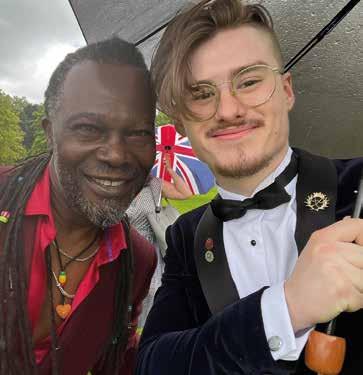
Duncan has just completed his first year studying acting at Norwich University of the Arts, following a difficult time settling into university life. Lynda said: “There are still considerable bumps in the road, but Duncan shows great fortitude and has now successfully completed Year 1 of his course. We are very proud.”
Duncan hopes to return to the DofE as an ambassador for the scheme that has helped him so much in his personal development.
Congratulations to Duncan Bolling on achieving his Gold Duke of Edinburgh (DofE) Award, which he received from HRH The Earl of Wessex. Here, Duncan discusses what the DofE Award meant to him as an autistic teenager
42 Your Autism
We are excited to be launching a Duke of Edinburgh Award programme specifically for autistic people. This will run first as a trial scheme for people in our schools, services and branches across the North of England. We hope to roll out the programme to people in our services across the UK. Read more at autism.org.uk/doe Would you like to share your achievements or passion here? Email us at YourAutismMag@nas.org.uk Snapshot

Empowering



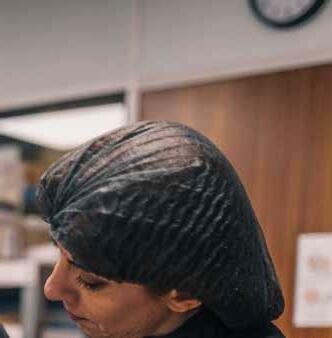
Autistic People with Award-Winning Chocolates



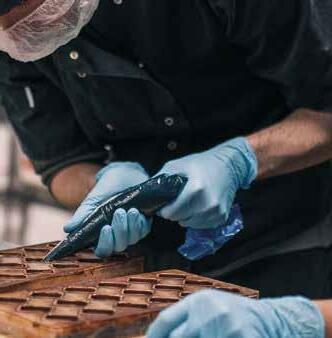
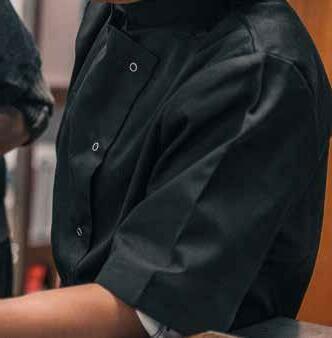
Award-winning flavours and positive social change, that’s us at Harry Specters. Mona, Shaz and their son Ash, who is autistic, are behind this social enterprise.
For every £1 spent at Harry Specters, 69p directly improves the lives of young autistic people and their families through paid employment, free work experience, and free training opportunities.


@harryspecters harryschocs.co.uk
